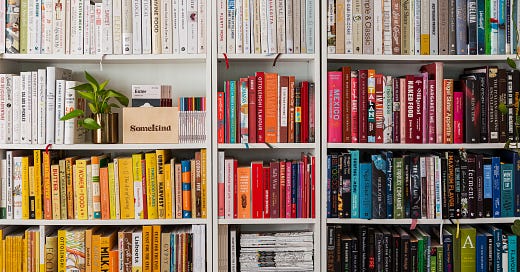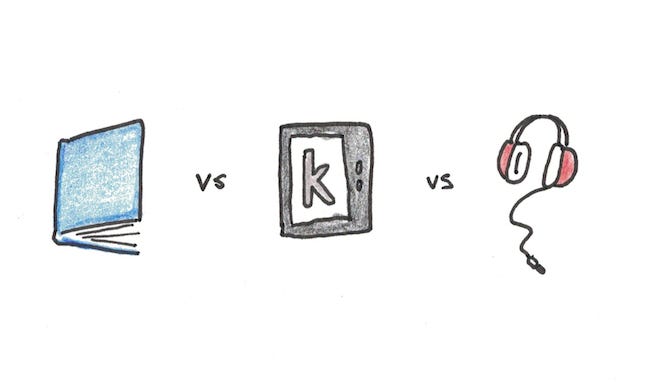“A reader lives a thousand lives before he dies . . . The man who never reads lives only one.”
Why we read
Reading is valuable because it allows you to access the collective knowledge and perspectives of humanity over thousands of years. These perspectives help build character and cultivate a sense of respect toward others by putting yourself in their shoes. So why doesn’t everybody read? One challenge is the distraction-filled world we live in.
Reading is hard because it requires intentionality, as opposed to say, watching TV, which requires very little from you. A lot of people have trouble sitting down and reading a book because it’s far easier to scroll through TikTok/Instagram and watch Netflix after a long day at work/school/life. If I can help even one person reduce the friction between them and reading I’d be happy - the world needs more readers!
Tools
Physical books: self-explanatory. Get as many physical books as you can get your hands on. Source these from the library, your local used book store (best option, in my opinion), from friends, or find deals online.
E-Reader: a kindle (or your alternative e-reader of choice) can be the most effective tool in your reading quiver. It takes some convincing for those of us who can’t quite let go of that real book feeling, but once you get it, you get it. A Kindle is a perfect addition to reading physical books. The main benefits of the Kindle are:
It’s convenient for traveling, commuting, or reading in the sun/dark/beach/water
Removes friction to test, buy, and read new books
Easily save and centralize highlights and notes
E-Books are much cheaper than buying physical copies (and can be free in some cases). You can download most books for free on Library Genesis and email the file to your Kindle
Audiobooks: a good addition to the toolkit for times when listening is easier than reading (while driving, commuting, exercising, walking, etc.). I personally use Audible and now also Spotify, but you can also get some free audiobooks using Libby, you just need a library card (from any library).
Bookshelves (Digital & Physical): Think of this like a trophy case - some external motivation to get us reading. I use Goodreads, which is arguably the worst website of all time, as my “digital bookshelf” to track all my books (want to read, read, currently reading) and see what friends are reading. A physical bookshelf in your home is also a great conversation starter. I just stack books on the floor (purely so I can say that I stack books on the floor because I think it sounds cool) but there are plenty of more aesthetic options online that I’ll look into one day.
Strategies that reduce friction
Right time, right place. I read less than 5 books during the first 18 years of my life, but I’ve read hundreds in the past few years. Growing up, it felt like there were just too many exciting, fast-paced things to pay attention to. If you’re not someone who naturally has a desire to read, it’s unlikely that you will be able to force yourself to do it, yet. There will come a time in your life when you’re in the right headspace to pick up a book, no need to rush it, just make sure you don’t put it off forever.
Focus on reading books that you enjoy. This is the most transformative step you can take toward reading more and ultimately becoming more interesting and informed. There’s a misconception that you have to read the books that are popular right now - think Indigo bestsellers. This is like listening to music on the radio vs. listening to your Spotify account - there’s no personalization with the radio and you’re just getting the mundane hits that drive revenue. Think about what you’re interested in and start reading authors/books that you can’t put down. Everyone has different preferences, so stop pretending like the self-help book your co-worker can’t stop raving about will do anything for you and pick up that niche novel that actually excites you (this is not me, I shamelessly love self-help books despite them often not being very useful).
Don’t settle for one book. Everyone’s perfect number will be different, but the key is to have options. You’re not always going to be in the mood to trudge through Ray Dalio’s latest book on economic theory, and that’s okay. I generally have four books on the go in total: two on Kindle, one physical, and one audiobook. Try to have some variety in what kinds of books you’re reading, for example, have some that are lighter for post-work reads, and some that are more challenging that can be read with your coffee in the morning while you still have brainpower. This one might be slightly psychotic to you and that’s okay, feel free to ignore this one if you’re a one-book warrior.
Read smart, not hard. Not all books are meant to be read cover to cover. Think about what you’re reading, is it fiction or nonfiction? If it’s nonfiction, have a look at the table of contents, circle the things that sound interesting, and read those first.
Preview books before reading. This is easy to do on an E-reader or audiobook (you can read the first few chapters of any book for free), and for physical books, you can rely on a combo of Goodreads reviews, friends who have read it or head into your local library or bookstore to read the first few pages. If you go in blindly you’ll find that lots of books, while interesting sounding, are horribly written and painful to get through. This is especially important for any translated books (Dostoyevsky for example) where multiple versions are available. My friend Ian built a useful tool called Iliad Translations that solves this problem for “The Iliad of Homer”.
Quit early. Don’t feel like you have to finish any book. Reading is not a winner take all game where if you don’t finish, you don’t get any benefit. Reading one chapter of a bad book and then putting it down is far better than struggling through while you could be reading something else. You have to consider the opportunity cost and the fact that you can always come back to a book later on.
Get the timing right. Try to choose your next book based on what is currently happening in your life not just what you think will be relevant or interesting to you in the future. Say you’re just graduating or changing careers, maybe choose a book about career growth instead of how to be a CEO because the former could have a huge impact if you read it now vs. later, and it might resonate more since you’re currently thinking about this topic already.
Don’t worry so much about memorizing or learning, just read. We grow up being taught that learning is all about memory which isn’t helpful in the real world (and will be increasingly unhelpful in a future with accessible AI). The beauty of reading is that it’s learning without effort. When you read things that are intriguing to you, it will kick off a chain reaction of thoughts in your mind, whether that’s immediate or at some random point in the future. It’s not about remembering or learning exactly what’s in a book, it’s about constantly evolving your perspective and creating new pathways in your brain. Reading is a process of learning, adapting, learning, adapting.
Happy reading!





